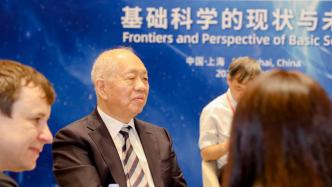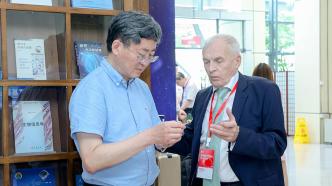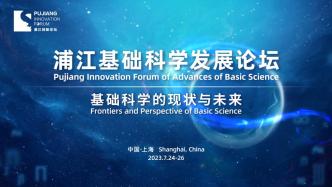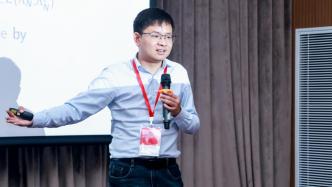
During the more than 40-minute interview, Ding Jian, a professor at the School of Mathematical Sciences of Peking University, and the reporters who listened to him laughed out loud many times.
A staff member who attended said: Ding Jian should be very good at lecturing.
Indeed, Ding Jian, wearing a shirt, jeans, sneakers, and glasses, is young, honest, forthright, and humorous. He just finished a report.
This is the scene in the "Academician's Home" at the Science Hall in Huangpu District, Shanghai on the morning of July 25, the second day of the Pujiang Basic Science Development Forum. The entire forum will last for three days. Academicians from home and abroad, many Fields Medal winners and other top scientists will discuss "the current situation and future of basic science".
At the end of the interview, Ding Jian gave the most vivid metaphor in the whole exchange. He said, "The work we do should be like completing a certain pass on the entire football (game) field."
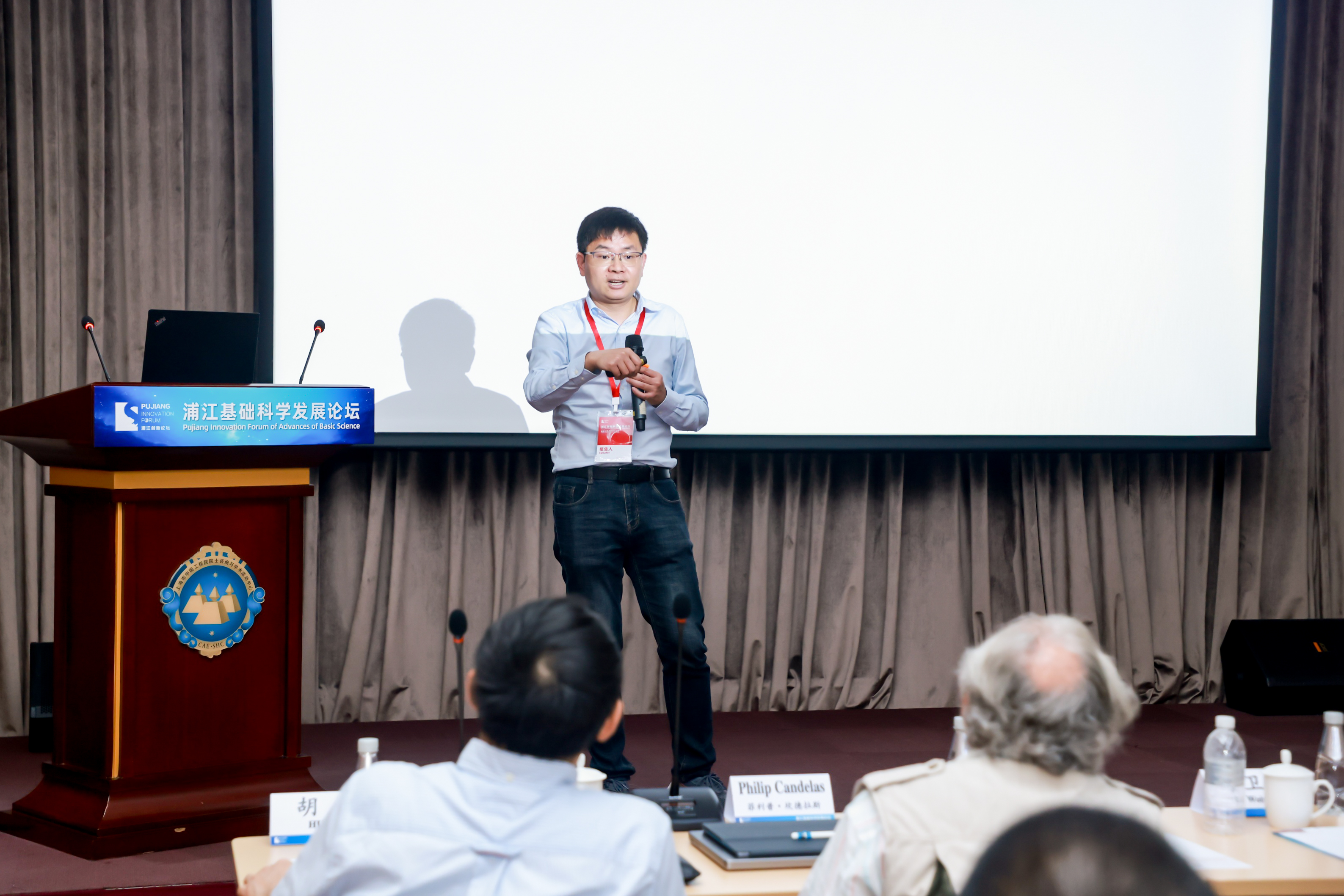
Ding Jian is a chair professor and doctoral supervisor of the School of Mathematical Sciences and the Center for Statistical Science, Peking University.
"Top" starting line
Is mathematics, especially advanced mathematics research, a purely intellectual game?
Ding Jian said, "I don't think our attitude towards mathematics is fundamentally different from a student's attitude towards mathematics. You can think of it as a game, but this game is not our usual game—Warcraft or something... ...What we want to understand is not that you set up a maze, and then I have to find a way out...What we need to understand are those puzzles that exist naturally...The laws of the world itself are what we need to understand."
As for who is suitable for mathematics research, Ding Jian said, "This is my understanding. If the feeling and understanding of mathematics are below a certain level, it may indeed not be suitable for mathematics as a profession. If this is the case, you should Mathematics is a tool, you can use whatever you have created... After this level, hard work and hard work become very meaningful, and luck is also very important... If you have no accumulation at all, even You do the right question at the right time, and you don't get the right answer."
On June 21, 2023, the Statistical Science Center of Peking University announced that Professor Ding Jian of the School of Mathematical Sciences and the Center for Statistical Sciences of Peking University was invited because of his outstanding work in probability theory and statistical physics. A one-hour conference report at the 2024 International Conference on Mathematical Physics (ICMP2024). This is the first time that domestic scholars have been invited to give a conference report since ICMP has been held for more than 50 years.
Mathematics was Dan Dingjian’s fourth choice in the college entrance examination. He once said, “At that time, it seemed to be a promising major.” , hoping to "curve to save the country" - transfer to computer science at the graduate level.
In 2006, Jian Ding received a bachelor's degree from the School of Mathematical Sciences, Peking University, and a doctorate degree from the University of California, Berkeley in 2011. He was an assistant professor and associate professor in the Department of Statistics at the University of Chicago, and the Gilbert Helman Chair Professor of Statistics at the University of Pennsylvania. and Professor of Data Science.
In January 2022, Ding Jian returned to China full-time to serve as a chair professor and doctoral supervisor of the School of Mathematical Sciences and the Center for Statistical Sciences of Peking University.
Ding Jian said, "I can't tell you the difference between the students of the University of Pennsylvania (University of Pennsylvania) and the Peking University students, but I can tell you the difference between the Peking University students 10 years ago and now." "I think today's children are quite strong. ""When we were studying, Peking University had already started to encourage students to explore freely—"undergraduate scientific research". Looking at our students, there are already many undergraduates who can make original achievements.”
Ding Jian once said that if an exam is a battle of wits and courage between teachers and students, then doing research means that teachers and students team up to "fight monsters and upgrade".
On the 25th, he said, "What I hope most is that after my help, some of the students are better than me." How much.” “Peking University has some students who study probability theory every year, maybe they are better than me... It is very likely that this is the case at Peking University, because they are really strong now... I can only encourage them and help them Overtake me, while making yourself better, increase the difficulty (factor) for them to surpass me, so that the difficulty factor for them to 'rub' me on the ground is slightly higher."
Ding Jian said, "It is necessary to study a doctorate abroad to do the best research today? I don't agree." "It is not necessary to have a doctorate from Harvard to do well (mathematics research)." "We are Try our best to make our postgraduates and doctoral students have the same starting line as the doctoral and postgraduate students of the world's top universities. We can do this, at least we are working hard."
The imperceptible "spark"
Ding Jian said that the speakers of the Pujiang Basic Science Development Forum cover mathematics, physics, computers and other fields. "My research direction is probability theory. I am concerned about probability theory, theoretical computers, and some issues related to statistical physics." "When communicating with small peers, everyone's way of thinking and considerations are relatively homogeneous, so they can often be inspired, but this kind of inspiration may not be so great." I don’t know. For example, if I go to listen to a report, I hear a certain theorem in number theory and think it is very useful, and it can be related to what I do. If this happens, it may be said that this will be a relatively big one. progress, and even in the next few years may continue to do some good work around this thing."
"It's really not that easy to create sparks with big peers", "There are still some sparks that I don't realize today", "I believe there are." Ding Jian said.
In the exchange, Ding Jian also mentioned "tasteful research". He said, first of all, this is a subjective judgment, and everyone has different judgment standards. He likes to state concise mathematical problems, "(for example) why is Goldbach's conjecture so deeply rooted in people's hearts? It can be explained clearly in a few words, and everyone can understand it, but it can't be done. It looks very profound and concise in statement. .”
"(But) the improvement of a generation's research taste is not to listen to one report, two reports, or an expert who came today and said 10 sentences to you, which will re-'dye' your outlook on life. No. That’s it. But if top people come to communicate with us constantly, the whole research taste will still have some subtle influence.” Ding Jian said.
Ding Jian also has his own views on top scholars. He said, "The top scholars we hope for are the most cutting-edge and inspiring to us. For example, some young people have just graduated and may not have won many great honors. But he is indeed regarded as a top scholar in research, because he is the best in that direction."
In addition, a reporter asked, "'Won the Davidson Award, mainly for the random k-SAT problem completed in cooperation', the terminology in it is very professional, but it is also difficult to understand. Do you expect your research work or results to be known to the public? and understand?"
Ding Jian said, "Everyone hopes (hope), right? But I don't have this kind of expectation (expect). Because what will be known to everyone in the end is likely to be a ' finishing kick' -finally put a big problem Solved. For the vast majority of us who are engaged in mathematical research, the work we do should be like completing a certain pass on the entire football (game) field , which does not need to be known to the public. (If ) You explain to the public, 'I passed a pass to him and it was a great pass,' and probably no one has the patience to listen to your little 'passes' ."

